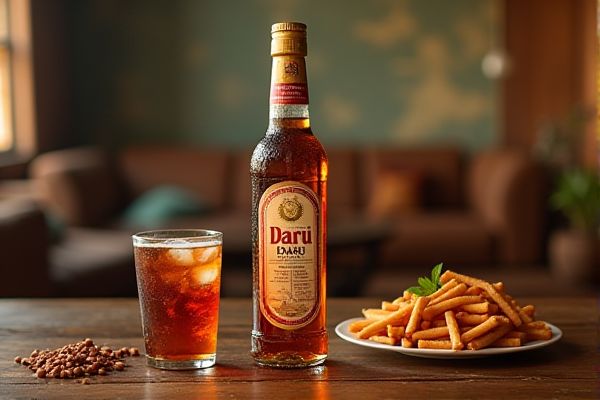
Desi daru brands in India reflect the country's rich cultural heritage and diverse drinking preferences. Popular options include Maharaja, which offers a variety of spirits that celebrate local flavors. You might also explore the offerings from brands like Rampur, known for its premium crafted whisky. These brands contribute to the vibrant landscape of Indian liquor, catering to both traditional tastes and modern palates.
Brands to consider
Bangla
Bangla is recognized as a notable brand in the desi daru segment in India, appealing to consumers with its rich heritage and cultural significance. The brand offers a diverse range of spirits, including whiskey, rum, and brandy, reflecting the traditional brewing techniques and local ingredients. With its affordability and accessible pricing, Bangla caters to a broad audience in the Indian market. The brand's reputation is further enhanced by its strong presence in regional festivities and celebrations, making it a familiar choice for those seeking authentic desi flavors.
Haryana No. 1
Haryana No. 1 is recognized for its superior quality of desi daru, crafted from the finest locally sourced ingredients. The brand reflects the rich cultural heritage of Haryana, known for its traditional brewing methods that enhance flavor and authenticity. Its popularity is bolstered by a loyal customer base that appreciates the balance of quality and affordability. Haryana No. 1 has also received accolades for its consistent production standards and commitment to regional craftsmanship, making it a significant player in the Indian spirits market.
Goldee
Goldee is a notable brand in the desi daru segment of India, known for its authentic flavors that resonate with traditional preferences. The brand sources high-quality ingredients, ensuring rich taste and cultural relevance. Goldee's commitment to craftsmanship is evident in its artisanal distillation process, which appeals to connoisseurs of Indian spirits. Targeting a diverse audience, Goldee embodies a modern take on classic desi drinks, making it an appealing choice for gatherings and celebrations. Choosing Goldee enhances your culinary experiences, pairing well with regional cuisines.
Hunter
Hunter is recognized as a premium desi daru brand in India, known for its authentic flavors and traditional production methods. It offers a blend of rich cultural heritage and modern innovation, appealing to a diverse consumer base. The brand focuses on quality ingredients sourced from local regions, ensuring a unique and satisfying drinking experience. Your choice of Hunter supports local artisans and contributes to the revival of traditional Indian spirits, making it a noteworthy option in the competitive liquor market.
Sikkim Club
Sikkim Club is a notable player in the desi daru market, offering a unique blend of traditional flavors and modern distillation techniques. Originating from the picturesque state of Sikkim, this brand embodies the rich cultural heritage of India, making it a distinctive choice for consumers seeking authenticity. With its emphasis on quality ingredients sourced locally, Sikkim Club not only supports sustainable practices but also elevates the drinking experience. Those who appreciate craft spirits will find that Sikkim Club reflects the essence of Indian craftsmanship in every bottle.
Popularity and Demand
Desi daru brands are experiencing a surge in popularity and demand across India, reflecting a growing preference for local spirits. Brands like Maharaja's Choice are gaining traction among consumers looking for traditional flavors. The rise of craft distilleries and regional brews has contributed to a vibrant market, engaging millennials and younger demographics seeking authentic experiences. The increasing acceptance of desi daru in social settings is driving sales, making it a notable segment in the Indian alcoholic beverage industry.
Regional Variations
Desi daru brands in India exhibit significant regional variations, reflecting local preferences and cultural influences. For instance, Maharashtra is known for its popular brand, "Gilbey's", while states like Goa favor locally distilled feni. In Punjab, "Raja" is a well-regarded brand among consumers. Your choice of desi daru can vary greatly depending on the region's traditions and availability, impacting both taste and quality. Each state contributes unique flavors and traditions to the desi daru market.
Pricing and Accessibility
Desi daru brands like Royal Challenge offer a variety of price points, catering to different consumer preferences in India. The average cost for a bottle can range from Rs250 to Rs800, depending on the brand and type of alcohol. Accessibility varies by region, with major cities like Mumbai and Delhi having multiple outlets. Rural areas may have limited availability, impacting consumer choices for desi daru options. You might explore local shops for regional brands that can provide unique flavors at competitive prices.
Traditional Brewing Methods
Traditional brewing methods for desi daru in India often involve age-old techniques that highlight regional flavors and local ingredients. The process typically starts with the fermentation of grains, fruits, or sugars, which varies from state to state. Some popular variations include Toddy and Fenny, both utilizing coconuts or cashew apples. You might find that local craft breweries emphasize these authentic methods, preserving the heritage of Indian alcoholic beverages. Brands like Goa's Fenny have gained recognition for their dedication to traditional brewing practices.
Regulatory Challenges
Desi daru brands in India face numerous regulatory challenges, including strict state laws governing liquor production and sales. The Prohibition Act in certain states restricts distillation and consumption, affecting brand visibility and market access. Compliance with the Food Safety and Standards Authority of India (FSSAI) regulations is vital for ensuring quality and safety standards. Taxation policies, particularly the Goods and Services Tax (GST), also impact pricing strategies and profitability. Your understanding of these dynamics can inform how brands like Sula Vineyards navigate the complex landscape of alcohol regulation in India.
 indiabrand.org
indiabrand.org